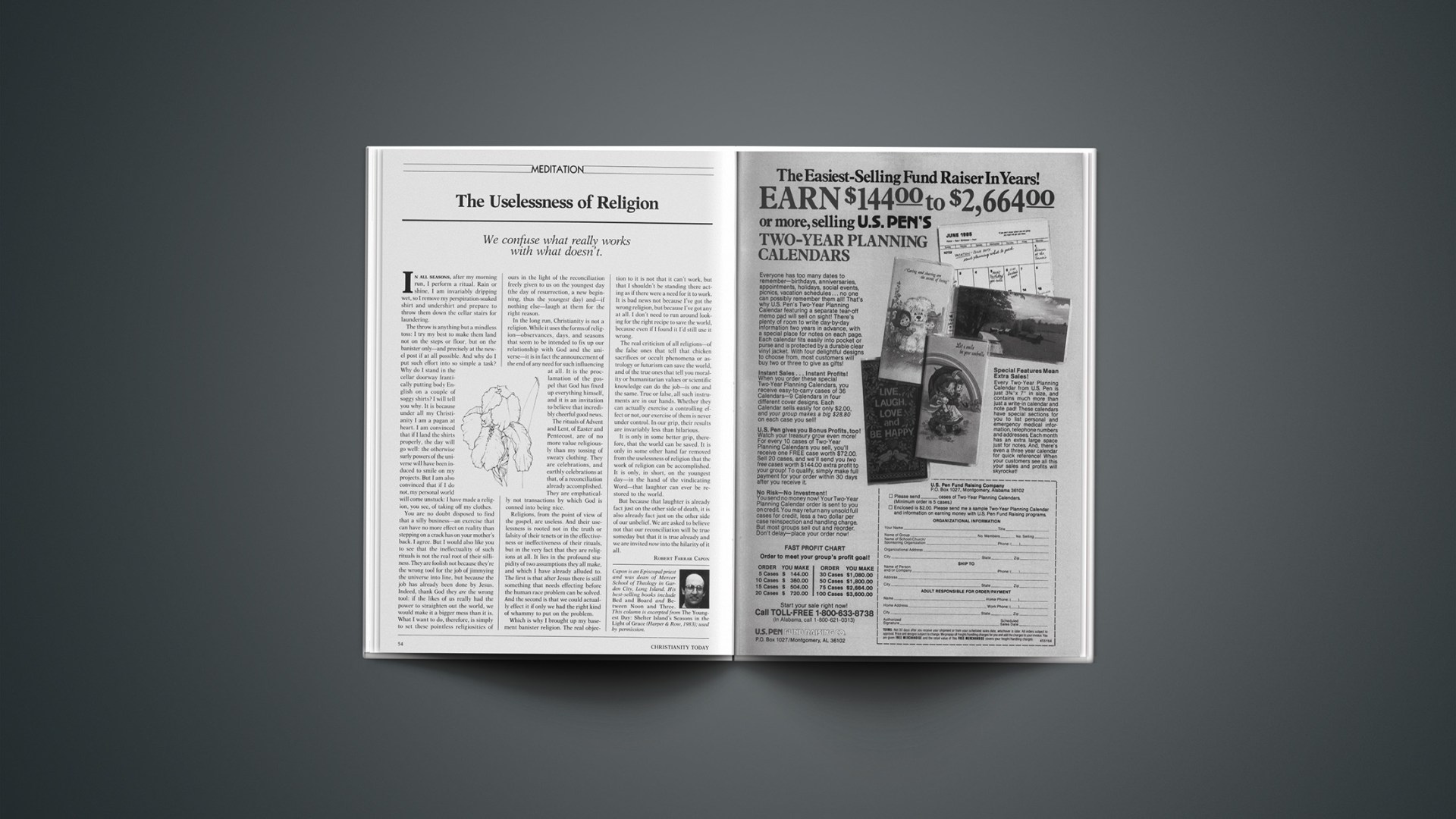We confuse what really works with what doesn’t.
In all seasons, after my morning run, I perform a ritual. Rain or shine, I am invariably dripping wet, so I remove my perspiration-soaked shirt and undershirt and prepare to throw them down the cellar stairs for laundering.
The throw is anything but a mindless toss: I try my best to make them land not on the steps or floor, but on the banister only—and precisely at the newel post if at all possible. And why do I put such effort into so simple a task? Why do I stand in the cellar doorway frantically putting body English on a couple of soggy shirts? I will tell you why. It is because under all my Christianity I am a pagan at heart. I am convinced that if I land the shirts properly, the day will go well: the otherwise surly powers of the universe will have been induced to smile on my projects. But I am also convinced that if I do not, my personal world will come unstuck: I have made a religion, you see, of taking off my clothes.
You are no doubt disposed to find that a silly business—an exercise that can have no more effect on reality than stepping on a crack has on your mother’s back. I agree. But I would also like you to see that the ineffectuality of such rituals is not the real root of their silliness. They are foolish not because they’re the wrong tool for the job of jimmying the universe into line, but because the job has already been done by Jesus. Indeed, thank God they are the wrong tool: if the likes of us really had the power to straighten out the world, we would make it a bigger mess than it is. What I want to do, therefore, is simply to set these pointless religiosities of ours in the light of the reconciliation freely given to us on the youngest day (the day of resurrection, a new beginning, thus the youngest day) and—if nothing else—laugh at them for the right reason.
In the long run, Christianity is not a religion. While it uses the forms of religion—observances, days, and seasons that seem to be intended to fix up our relationship with God and the universe—it is in fact the announcement of the end of any need for such influencing at all. It is the proclamation of the gospel that God has fixed up everything himself, and it is an invitation to believe that incredibly cheerful good news.
The rituals of Advent and Lent, of Easter and Pentecost, are of no more value religiously than my tossing of sweaty clothing. They are celebrations, and earthly celebrations at that, of a reconciliation already accomplished. They are emphatically not transactions by which God is conned into being nice.
Religions, from the point of view of the gospel, are useless. And their uselessness is rooted not in the truth or falsity of their tenets or in the effectiveness or ineffectiveness of their rituals, but in the very fact that they are religions at all. It lies in the profound stupidity of two assumptions they all make, and which I have already alluded to. The first is that after Jesus there is still something that needs effecting before the human race problem can be solved. And the second is that we could actually effect it if only we had the right kind of whammy to put on the problem.
Which is why I brought up my basement banister religion. The real objecttion to it is not that it can’t work, but that I shouldn’t be standing there acting as if there were a need for it to work. It is bad news not because I’ve got the wrong religion, but because I’ve got any at all. I don’t need to run around looking for the right recipe to save the world, because even if I found it I’d still use it wrong.
The real criticism of all religions—of the false ones that tell that chicken sacrifices or occult phenomena or astrology or futurism can save the world, and of the true ones that tell you morality or humanitarian values or scientific knowledge can do the job—is one and the same. True or false, all such instruments are in our hands. Whether they can actually exercise a controlling effect or not, our exercise of them is never under control. In our grip, their results are invariably less than hilarious.
It is only in some better grip, therefore, that the world can be saved. It is only in some other hand far removed from the uselessness of religion that the work of religion can be accomplished. It is only, in short, on the youngest day—in the hand of the vindicating Word—that laughter can ever be restored to the world.
But because that laughter is already fact just on the other side of death, it is also already fact just on the other side of our unbelief. We are asked to believe not that our reconciliation will be true someday but that it is true already and we are invited now into the hilarity of it all.
Capon is an Episcopal priest and was dean of Mercer School of Theology in Garden City, Long Island. His best-selling books include Bed and Board and Between Noon and Three. This column is excerpted from The Youngest Day: Shelter Island’s Seasons in the Light of Grace (Harper & Row, 1983); used by permission.










